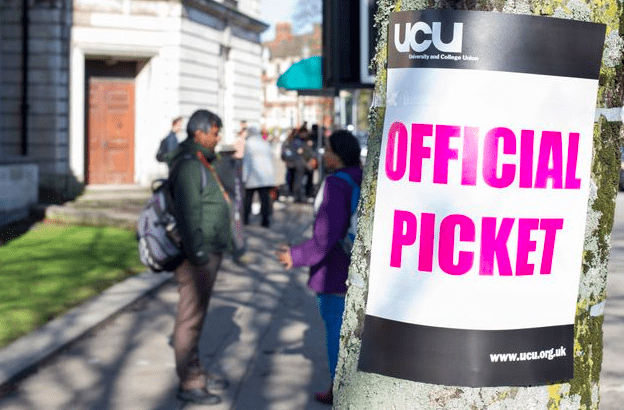From Monday 25th November to Wednesday 4th December, eight days of strikes took place at sixty universities across the UK. Forty thousand members of university staff took part in industrial action to back continuing debates over pay, pensions and working conditions.
As a result, around a million students are affected. Many have chosen to get involved and act in solidarity with university employees on the picket lines. Student occupations of university buildings have also taken place at Edinburgh, Strathclyde and Stirling universities.
However, international students studying at UK universities do not feel able to show their support for the University and College Union (UCU) members as they feel they must continue to cross picket lines.
Every international student is obliged to have their attendance documented. Should it drop below 80%, the university must report the student to the Home Office.
According to the UCU, absences due to industrial action should not be included. But if a student misses an ongoing class to support the strikes then this would be considered an unauthorised absence. Unfortunately, many students continue to be uncertain which lecturers are taking part in the strikes, and tend to skip lectures assuming they are cancelled which is not always the case.
University advice and welfare departments have been swamped with concerned students, especially international undergraduates concerned about their attendance. A university administrator at one Russell Group university said “Our student welfare services are stretched at the best of times, now, they are overrun.”
Seventy student-led groups and student unions have issued statements supporting the strikes and members of the UCU choosing to take industrial action. They called on university managers to publicly issue a statement cancelling all student attendance registers on strike days, including classes ongoing during strike action.
“Monitoring migrant students’ attendance on strike days amounts to the cynical use of students’ visa precarity against workers’ right to industrial action,” said the statement, which was supported by groups including the National Union of Students, People & Planet, Rent Strike and Student Climate Action.

Universities all over the country have responded to this statement. The University of Liverpool received criticism after managers sent an email to undergraduates on Friday warning them it was ‘unlawful’ to join pickets. In the same email, international students were informed that anyone who chose not to cross picket lines to attend teaching sessions risked jeopardising their visa.
Consequently, nine external examiners at Liverpool resigned from their roles in protest, accusing managers of misrepresenting the law regarding support for official pickets and “weaponising” the UK immigration system against visa-holding students.
The immigration advisory service at Goldsmiths, University of London also replied to the controversy, emailing international students on 22 November, to tell them their visa status would not be affected by academic sessions cancelled because of industrial action, but warning they would be expected to attend academic sessions which continue to take place as scheduled.
Robert Liow, international students’ officer at Goldsmiths, condemned this behaviour:
“This creates a climate of fear. International students on Tier 4 visas have been stripped of their right to choose solidarity and not cross the picket line during the strikes with punitive action that puts their visa status and future career in the UK at risk.”
A spokesperson for Goldsmiths, University of London, defended these actions, stating that the email was a regular reminder sent in the autumn term every year, as part of a range of support and information shared with international students.
The UCU general secretary, Jo Grady, said:
“Threatening students who simply want to support their striking lecturers is an underhand tactic that rather reeks of desperation. In the current climate universities should be doing all they can to show off the UK as a welcoming place for international students to come and study, not making short-term threats because they refuse to tackle serious problems at the heart of these disputes.”
The UCU is expected to re-ballot a further thirteen UK universities, ahead of possible further action in the new year, to encourage support if disputes cannot be resolved. The re-ballots will start next week and will run until the end of January.
Main image: Barcroft Media via HuffPost

